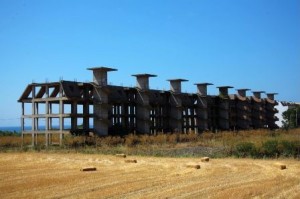
The traditional feast is like a litmus test: it changes naturally as the group that takes part in it changes, writes Angelo Maggio, Calabrian photographer after participating to the festa della Vergine at Polsi some years ago. Popular feasts change, tradition is reinvented and rewritten, according to new needs. After the nineties, in Calabria (Southern Italy), the “second folk revival” (studied by australian anthropologist Stephen Bennetts), converted festivals in an excuse to attract tourists and money to small villages mostly depopulated: but this commercialization reduces Calabrian popular culture to “tarantelle”, excluding all the rest of local popular traditions, that end up homologated in a common regional-popular denominator. At the same time, more dangerous manipulations are taking place. A series of grim individuals linked to mafia “clans” are publishing articles, books and records presenting ‘ndrangheta (Calabrian mafia) as a cultural phenomenon, linked to folklore and popular traditions of Calabria; thus giving a kind of ethnic legitimacy to the cruelty of clans in front of public opinion – even internationally. Meanwhile, local anthropologists keep classifying ethnomusicological variants, showing little concern towards this public manipulations of their object of study.
- Stephen BENNETTS (2006) Berlusconi hasn’t arrived here yet: the Contempoary Southern Italian Folk Revival as a Response to Modernity, PhD thesis on the italian second folk-revival [RTF italian]
- Angelo MAGGIO (2012) “La parabola dei folk-festival”, in Napolimonitor [link, italian]; one of the founders of Tarantella Power festival in Caulonia explains how the City Council of the small town – after kidnapping the festival – this year tried to divert funds intended for migrants to pay a concert of arab music, with the excuse of multiculturalism.
- Francesca VISCONE (2011) “Se la mala è folklore”, Malitalia [link]. This Calabrian journalist, author of La globalizzazione delle cattive idee (Rubbettino, 2005, link) suffered menaces from the photographer Francesco Sbano because she denounced how this “culturalist” vision of ‘ndrangheta is a product of the collaboration of clans with the press. Some examples are the record La musica della mafia, or the book Malacarne by Alberto Giuliani. An event that draw some attention to this collaborations occurred when Der Spiegel journalist Andreas Ulrich, suspected of relationship with clans, published a reportage in the important italian left-wing review Internazionale.
- It’s also worth exploring the work of Arturo LAVORATO on African migrants working in rural Calabria: “Will Africans save Rosarno?” (2009) [video]. The title recalls the book edited by Antonello Mangano about the migrant revolts of 2008 in the Calabrian village of Rosarno. See also the short movie by Wim Wenders, Il volo, shot in Riace Jonica [youtube].